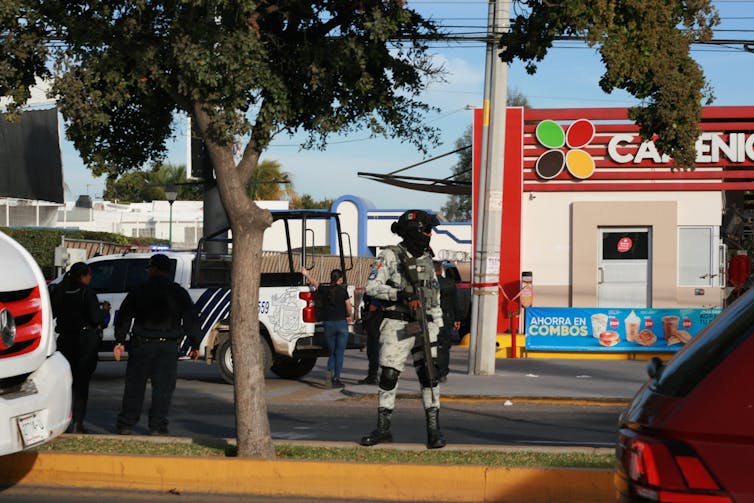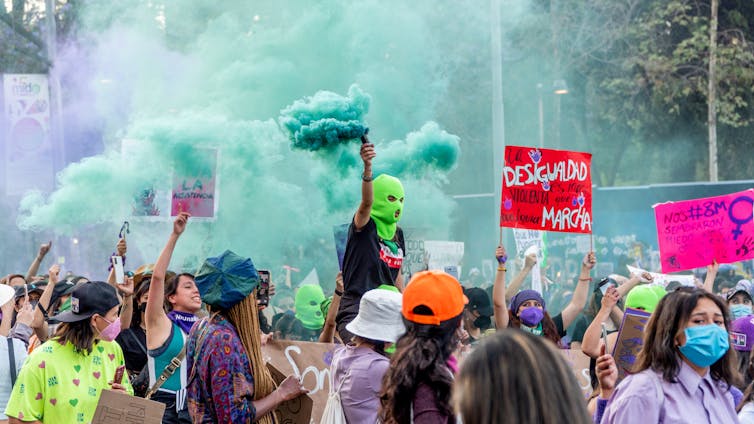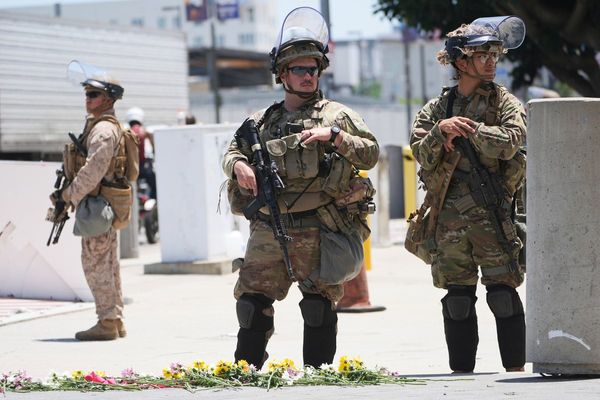Mexico’s drug cartels are often described as powerful rivals to the state, with their influence measured in weapons, money and murdered officials. But this framing misses a fundamental truth. Organised crime in Mexico is also a system of gendered governance – one that disciplines, controls and sometimes eliminates women to consolidate power.
The term “narco-femicide” captures this brutal dynamic. Narco-femicide refers not simply to the killing of women, but to the strategic use of gendered violence by criminal organisations to enforce social norms, maintain control and assert dominance in the absence – or even with the complicity – of the state.
According to a study by Lantia Intelligence, a Mexico-based data intelligence firm, organised crime was responsible for 60% of femicides in Mexico in 2020. That year, 1,891 women were violently murdered by drug cartels – an increase of nearly 40% compared to 2018.
These murders are not private tragedies, nor are they collateral damage. They are political acts, central to how criminal sovereignty in Mexico is exercised and reproduced.
Get your news from actual experts, straight to your inbox. Sign up to our daily newsletter to receive all The Conversation UK’s latest coverage of news and research, from politics and business to the arts and sciences.
Mexico has one of the highest rates of femicide in Latin America. According to Amnesty International, approximately ten women were murdered there every day throughout 2020. In cities such as the border town of Ciudad Juárez, which was once labelled the “femicide capital of the world”, these deaths are marked by sexual violence, mutilation and public display.
The causes of femicide in Mexico do vary. But a significant proportion of these murders occur in regions such as Jalisco, Guerrero and Chihuahua, where there is a strong cartel presence. The correlation is no coincidence.
As the Atlantic Council, an international affairs thinktank, observed in 2024: “in areas [of Mexico] controlled by drug cartels, violence against women intensifies”. It added that families often won’t report abuse or rape “out of fear of retribution”.
The same article said that cartels turn attacks on women into “a tool of intimidation and a display of dominance”, warning the community not to defy them. The impunity of cartel violence, and examples of brutal public punishment, enforce an unwritten code that women must “know their place”.
Femicide in cartel-run areas follows a distinct pattern. Women are punished for being too visible, independent or defiant of the patriarchal order imposed by criminal groups. The victims include journalists, business owners and others who pose no military threat but represent a challenge to social control by in some way defying the cartels.

One prominent example is Marisol Macías, a journalist who was killed in 2011 in the border city of Nuevo Laredo after denouncing local gangs on the internet. She was decapitated and a handwritten sign was left beside her body saying she was killed in retaliation for her social media posts.
More recently, in July 2024, Minerva Pérez Castro, the president of an advocacy group for Mexico’s fishing industry, was shot dead hours after making public comments about the presence of illegal fishing in the state of Baja California. Organised crime groups have long participated in illegal fishing in northern Mexico.
Even when women are involved in organised crime, their roles remain precarious. They are valued only insofar as they serve the cartels’ interests, and are easily disposed of if they become liabilities.
A 2016 report by Amnesty International found that gangs routinely recruit vulnerable young women to do “the lowest and most dangerous tasks”, such as smuggling drugs or acting as lookout, precisely because they are “considered expendable if arrested”.
Where is the state?
What makes narco-femicide in Mexico so devastating is not just the violence itself, but the vacuum when it comes to accountability – or worse – the actual collusion of the state. In many regions of Mexico, law enforcement is unwilling or unable to investigate femicides.
Disappearances go unrecorded and families face indifference or hostility when demanding answers. In fact, according to Amnesty International, more than 90% of femicides in Mexico go unpunished. This impunity is a structural failure.
The boundary between criminal and state power is blurred in regions where there is a strong cartel presence. Police, politicians and criminal groups often operate in overlapping networks, leaving little space for genuine accountability.
Meanwhile, Mexico’s security strategy has been heavily shaped by the US-funded Mérida Initiative. Signed in 2007, the initiative deepened security assistance from the US to Mexico to fight organised crime.
The Mérida Initiative officially ended in 2021, but Mexico’s strategy remains focused on military operations against crime groups and the arrest of cartel kingpins. This has diverted attention from much-needed reforms in local policing and justice, perpetuating impunity and weakening trust in institutions.
By failing to protect women, the state effectively legitimises the cartels’ patriarchal rule. As a result, many Mexican women are living under a shadow legal system enforced by cartel violence, one where stepping outside the lines can carry deadly consequences.

Narco-femicide demands a response that moves beyond militarised crackdowns and technocratic reforms. Mexico needs policies that prioritise community-based justice, survivor-led advocacy and gender-sensitive policing. The experiences of women and frontline defenders need to be central in both research and public the debate.
The problem also needs to be named for what it is. Narco-femicide is not a private horror or a cultural anomaly. It is political violence that is perpetrated systematically and strategically.
If organised crime governs through the control and erasure of women, then any meaningful resistance must begin by making that violence visible. Cartels and the state must both be held accountable, and these deaths must not be treated as inevitable.
Adriana Marin does not work for, consult, own shares in or receive funding from any company or organisation that would benefit from this article, and has disclosed no relevant affiliations beyond their academic appointment.
This article was originally published on The Conversation. Read the original article.







